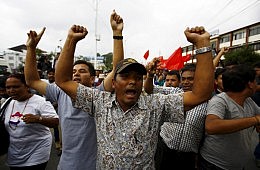Our Announcements
Sorry, but you are looking for something that isn't here.
Posted by Brave_Heart in Casteism in India-Alive & Thriving in Stealth Mode, HINDUISM CULT, Hindus Ignore Rape on December 13th, 2017
Has Caste Discrimination Followed Indians Overseas?
“One is of the opinion that you leave behind all the trappings of the caste system once you leave India, but perhaps I was naive.”
Saunvedan Aparanti, an Indian student studying in London, has found himself at the center of a heated campaign to introduce caste discrimination legislation in the United Kingdom. Having moved to Britain for university, Aparanti was surprised to find himself at the receiving end of “caste supremacy” from his new flatmates. The caste system he speaks of — and its trappings — is one that the world has, unfortunately, become familiar with. Stories relating to caste violence frequently emerge from some South Asian countries, particularly India, Pakistan, Sri Lanka, and Nepal. Headlines featuring the rape and murder of so-called “lower caste” people, or Dalits, are no longer rare.
Everyone is in agreement that this mistreatment of people based on an ancient social hierarchy is horrific and that it must be combatted. But when Indians say caste discrimination has followed them overseas, the solution doesn’t appear as straightforward anymore.

Across the UK, a fierce debate has been playing out within the British-Indian community over whether there is a need to introduce legislation for caste discrimination. In 2011, the employment tribunal heard its first claim of caste discrimination when a couple alleged they had been wrongfully dismissed by their employers because of their inter-caste marriage. Vijay Begraj claimed he was told by a “higher caste” colleague that he was lucky to be working in a law firm as his caste would have made him a cleaner in India. The tribunal also heard that Begraj had been assaulted by relatives of one of the firm’s partners and had been called derogatory caste names. The law firm in question, Heer Manak, denied the allegations until the case was ultimately abandoned in 2013.
Stories such as Begraj’s have united Dalit rights campaigners in the U.K. in the fight for caste law. Caste Watch UK, the Dalit Solidarity Network UK, and the Anti-Caste Discrimination Alliance are a few who have taken center stage in the campaign, with support from a number of academics. The United Nations has also lent a voice to the debate, urging the UK government to implement caste discrimination law.
Manifestations of Caste in the UK
So who is experiencing caste discrimination in the UK? And where and how are they experiencing it?
Numerous reports have been put together, each compiling a number of U.K.-based case studies of caste discrimination. Due to the stigma that comes along with being a “lower caste” person, many are afraid to speak out publicly. Instead, they choose to isolate themselves from the Indian community in the UK and live among non-Indians who have little understanding of caste dynamics.
Research conducted by the National Institute of Economic and Social Research and the Equality and Human Rights Commission has detailed various incidents of caste discrimination in the UK. The majority of these appear to occur in the personal sphere, which falls outside the reach of the Equality Act 2010, which relates to education, employment, and provision of goods and services. This has led some to question whether the implementation of caste under the Equality Act would do very much to combat instances of discrimination among social circles.
However, Dr. Meena Dhanda, a leading academic in diaspora Dalit studies, has noted that there is crossover between what happens in the private and public spheres. She argues that if prejudice exists, it cannot always be assumed that this prejudice does not cross over into the areas of employment and education.
Reena Jaisiah, a young woman of Dalit ancestry, illustrates how this crossover is possible. Her experience saw her become the victim of caste discrimination on the school playground, where students would bully her and call her derogatory names relating to her caste. This then carried on into her adult life, when she was running her shop and found that an elderly “upper caste” woman consistently refused to put money in her hand, instead placing it on the counter.
“That is exercising untouchability here in the U.K.,” Jaisiah said in Caste Aside, a documentary that sees her recount her life as a “lower caste” woman in Britain. Jaisiah’s experience doesn’t appear to be an isolated one, with caste rights groups such as the Dalit Solidarity Network UK and Caste Watch UK noting that they receive calls from people across Britain who say they too have become victims of caste discrimination.
“This is a rights issue that’s happening across South Asia,” said Meena Varma, director of Dalit Solidarity Network UK. “In fact it’s happening globally, because wherever the diaspora go, they take their caste with them, and so, therefore, that discrimination goes with them.”
Arguments Against Caste Legislation
However, not everyone in the British-Indian community believes that caste legislation is necessary in the U.K. The Hindu Council UK and the National Council of Hindu Temples UK have both opposed the calls for caste legislation, with politicians such as MP Bob Blackman backing them.
“Caste legislation simply doesn’t stand ground,” said Anil Bhanot, director of interfaith relations at the Hindu Council UK. “Dalits have become rich now here because there’s no discrimination.”
Bhanot goes on to note that the instances of caste discrimination that have been brought up so far relate to prejudice within social circles, rather than discrimination that would fall under the realm of equality law. He also argued that implementing this legislation will make caste more prominent among British-Indians, bringing awareness of caste where he says there is currently none.
Satish Sharma, general secretary of the National Council of Hindu Temples UK, takes a similar perspective on the legislation. When asked to characterize the Hindu community in the UK, Sharma commended the “harmonious” nature of the community and emphasized that the current generation of British-Hindus have been free from the understandings of the caste system and do not discriminate against each other in any way. He fears that this legislation, if implemented, will automatically presume certain members of the community — anyone who isn’t a Dalit — are “prejudiced by birth.” He strongly opposed this notion and restated his belief that caste is not an aspect of the Hindu religion. Instead, he argues, caste, as it exists today, is a Euro-Christian concept imposed on Indian people.
“Where does this notion that there is some sort of superiority being played out in the British-Hindu community come from?” Sharma questioned. “It’s purely an act of mischief. And if that isn’t a recipe for friction, then I don’t know what is.”
What Happens Next
On September 18, the British government ended a public consultation on caste and equality law in Great Britain, which invited the public to submit their views on “how to ensure that there is appropriate and proportionate legal protection” against caste discrimination. Groups on both sides of the debate rallied supporters to submit their thoughts on the issue.
Sat Pal Muman, Chairman of Caste Watch UK, has hit back at those opposing the legislation, saying: “They are afraid that if caste discrimination law does kick in, somehow it will affect their religion. They may have something to hide, there may be some skeletons in their cupboard.”
As the debate continues, campaigners are hoping that a decision will be made on the legislation in early 2018. Hindus groups remain concerned that bringing caste into U.K. law will send a message that caste is becoming a prominent feature in British-Indian society; something that they believe is far from true. Meanwhile, Dalit rights groups remain anxious about what will happen to the thousands of caste discrimination victims they say they know in the UK.
Future cohesion of the British-Indian community hangs in the balance as the UK government mulls its next move.
Priyanka Mogul is a freelance journalist based in London. She is the producer of Caste Aside, a documentary about the British government’s controversial decision to introduce legislation against caste discrimination in the U.K.

